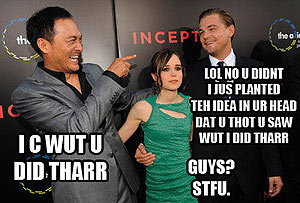Feed Your Head
Published on July 30th, 2010 in: Editorial, Movies, Science Fiction |The movie medium began as a series of technical advancements and research projects, an attempt to put still photographs into motion, beginning with Eadweard Muybridge’s “zoopraxiscope” and Thomas Edison’s inventions of the kinetoscope in 1889 and the vitascope in 1895, and quickly moving towards the many imitations and variations that followed.
According to film historian Benjamin B. Hampton, Edison was too involved in his laboratory experiments and “too far removed from the public to realize that his invention was anything more than a toy.” Yet soon, “[M]en with keener commercial sense than Edison. . . saw a field of money-making.”

Altered States, 1980
Although the more artistic possibilities of this new medium would soon reveal themselves through films like George Méliès’ A Trip To The Moon, these seem to have been exceptions to the norm. Hampton notes that although “[T]here was no opposition to quality; there merely was no conscious effort” since the main objectives were that the films “did not require any more film or cost any more money.”
And there was a lot of money to be made. By 1913, the gross income of Edison’s Vitagraph corporation “was between five and six million dollars a year,” a nearly inconceivable amount of money for the time. The battle between art and commerce has continued in the film industry ever since.
Although frequently critically acclaimed for his artistic vision and cinematic achievement, Christopher Nolan’s detractors are out there. While he certainly has acquired commercial success (The Dark Knight has grossed over a billion dollars worldwide), his latest film, Inception (already grossing over $230 million), not only seems to have critics divided on its artistic merits, but also the very purpose of film and film criticism.
Benjamin Hampton is definite about the origins of the film medium: “It was a romantic device to bring entertainment to the common people.” But what has such entertainment become, over a century later? Can the somewhat passive act of being entertained be divided from the more active process of critical thinking?
The “Inception Backlash” has been well documented, beginning with the first batch of reviews in early July. In a July 8 piece on Popmatters, Patrick Goldstein suggests he may have actually injured himself from “trying to bear the weight” of the numerous pretentious references in advance screening reviews. Reuters writer Iain Blair jumped into the ring on July 14, wondering if Inception was “Too Brainy For Summer.”

Altered States, 1980
Yet, the LA Times noted that while early reviews were still overwhelmingly positive, by the time the “second wave” of reviews came crashing in, critics weren’t quite so complimentary. By July 19, the predicted critical backlash seemed to have become a reality.
The polar oppositions are almost as intriguing as Inception‘s plot. One critic’s (or several) “clunky exposition” is another’s “device for tutoring,” “narrated instruction manual. . . at which Nolan excels” or “catch-up explanation,” leaving me to wonder, did we see the same movie?
Michael Phillips of the Chicago Tribune points to the “tendency in the blogosphere and maybe in American culture at large to take anything new and either detest or adore it,” and offers that perhaps critics “are trying to . . . bring an element of nuance.” This begs the question: exactly which critics are we talking about here?
Anyone who spends time on the Internet knows about flame wars, especially when fanboys (and fangirls) are involved. So is there a real distinction between someone like Roger Ebert and a widely read film blog like The Film Experience; in other words, what qualifies someone to be a film critic?
Reviled NY Press film critic Armond White recently spoke to Slashfilm about this issue, stating: “There should be no film critics younger than 30. Because before that you don’t know enough about art, you don’t know enough about life. And I repeat to you, I started out as a young person interested in writing about film, but really really really, I know more now than I knew then.”
As for “not knowing enough,” a quick (but not painless) scan of White’s reviews reveals an abundance of virulent criticism, but not of the constructive kind. Are filmmakers not allowed to learn from their mistakes or (heaven forbid!) even make them in the first place? Where does that leave film critics? I’ll grant White that background is key; every half-decent critic needs some context before making a definitive analysis of a piece of pop culture. “I liked it” or “I hated it” isn’t going to cut it.

Which brings us back to Inception. It may not require context to appreciate it, but it does require some brainpower. Just how much is what seems to be up for debate. Empire Online‘s Nev Pierce thinks Inception “embraces intellect and emotion but also sheer entertainment” while Lou Lumenick of the New York Post says it ” may well be a masterpiece masquerading as a summer blockbuster. . . text for a few seconds and you may miss a key development.”
At the risk of sounding like the “get off my lawn you damn kids” guy (or Armond White), I propose that anyone who texts during a movie has no right to be a film critic much less a film viewer. Perhaps for some film is “just” entertainment, but there are laws against texting while driving; it also necessitates the act of paying attention. I’m not suggesting that the movie experience should be as mentally exhausting as final exams, but on the other hand, why are people who like to give their brains a workout being made to feel guilty for not being confused?
If someone as inventive as Christopher Nolan is going to take the time and effort (and yes, capital) to provide us with such a delicious meal, shouldn’t we show up with an appetite?
Less Lee Moore, Managing Editor
6 Responses to “Feed Your Head”
July 31st, 2010 at 12:26 am
I didn’t realize there was a backlash against “Inception.” I thought the vast majority of critics liked the film.
As with any art form, I don’t see why some people think that most people have to have the same opinion about a film. I think most people have an inflated opinion about their own opinion.
Getting into the argument about whose opinion is more valid, the only opinion that matters to me is my own. And I’m the only one allowed to change it.
I think theaters should prevent patrons from using the restrooms or getting snacks, but that’s just my opinion. 🙂
July 31st, 2010 at 10:03 am
I think the toilets should be installed right in the chairs! Like that Mr. Show episode about “The Burgundy Loaf” . . .
Okay, maybe not!
LLM
July 31st, 2010 at 11:44 am
I wasn’t reallty aware of the backlash either. I’m not too worried about, it, though–people are loving this movie!
July 31st, 2010 at 11:47 pm
MASSIVE backlash, actually. TheRumpus.net, in particular, to my great dismay, was particularly vicious. I had my own issues with the movie (yes, Mr. Exposition is a major start of the picture) but by damn, I loved it all, and I thought it was a wonderfully entertainining metaphor for the “consensual hallucination” that is the act of watching a movie. It’s not often that you get a major action movie that is actually a statement about cognition – and that makes the movie a masterpiece to ME. Also, JGL and Tom Hardy (and Leo’s crooked tooth) are incredibly cute. 😉
August 1st, 2010 at 10:50 am
Ooh, I never thought about the movie as a metaphor for the act of watching a movie. I love that. I love self-reflexivity in film.
LLM
September 1st, 2010 at 8:17 am
I read an interesting discussion about Inception where it was suggested that people who regularly play video games find it much easier to understand. I thought it was a VERY good film – well acted, directed, etc – but like most people I know, didn’t find it remotely confusing. Perhaps that might be from playing the trapped-within-a-dream levels in Dragon Age: Origins, earlier in the year?
Time limit is exhausted. Please reload the CAPTCHA.